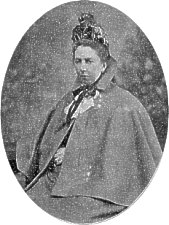
MRS. STRATON
[From 1901 Examiner Annual]

MRS. STRATON
IS the excellent wife of the good Bishop of Sodor and Man, the Right Rev. Norman Dulnenil John Straton, D.D. Mrs. Straton cause to the Island from Yorkshire with a capital reputation as a church worker, and that reputation she has well maintained during her residence here. The Girls' Friendly , the Young Woman’s Christian
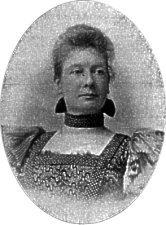
WIFE of Mr. Alfred Nelson Laughton, High-Bailiff of Peel, is one of the most useful and popular ladies in the Isle of Man. As Secretary of the Music Competitions in connection with the Isle of Man Fine Arts and Industrial Guild, she has rendered splendid service in spreading a knowledge and love of music throughout the Island. Some few years ago Mrs. Laughton was associated with a gallant though unsuccessful attempt to organise in the Isle of Man an association on the lines of the Cottage Industries Associations of Scotland and Ireland. Also is she a member of the Committee of the Isle of Man School of Art. Mrs. Laughton is a charming hostess, and has a well-deserved reputation for bringing tact and grace and goodwill to bear in all the work she undertakes
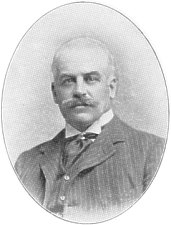
IS the eldest son of the Rev. John James Stevenson Moore, LL D., Vicar of Dagenham. Essex, and grandson of the late Mr. John Stevenson Moore, of Lhergydhoo, near Peel. After graduating B.A at Oxford. Mr Moore studied for the English Bar, and was called in 1832 Subsequently he took his degree of M.A , and was, after practising for some years in the English Courts, appointed Northern Deemster of Man in June, 1900, upon the promotion of Deemster Kneen to the Southern Deemstership. Deemster Moore Held the Equity Scholarship of the Middle Temple, and the prize for Roman Law and jurisprudence given by the Council of Legal Education. He was also Counsel to the French Embassy. [resigned 1921]
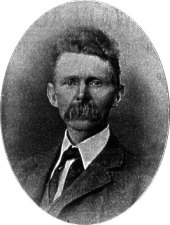
IS the manager in the Isle of Man for the National Telephone Company, and, although one of the busiest men in the Island, he is so retiring in demeanour that he is not nearly so well known as he deserves to be. He is a born electrician, and long before the National Telephone Company came into existence he installed and worked successfully a telephone exchange in Douglas. He eventually disposed of his rights to the National Company, and was thereupon appointed as its manager in the Island. In connection with the Company's system in the Island there are now 600 subscribers, and as many as 7,000 calls have been regulated in one day at Douglas alone. In addition to Douglas-Ramsey, Castletown, Peel, Port Erin, Port St. Mary, and Onchan are now in communication by telephone. Mr. Gillmore's duties and responsibilities are in consequence very numerous and important, but he is always there when wanted.
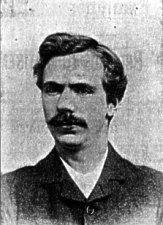
MR. William Taubman Crennell, of Ramsey, is the most recently elected member of the House of Keys, and fills the position rendered vacant in September, 1899, by the lamented death of Mr. J. Kaighin (Michael Sheading). Mr. Crennell's late father represented the town of Ramsey in the Keys for some years. The new member for Michael has served his native town on the Board of Commissioners, and has taken an active interest in educational affairs, being an ardent supporter of the denominational school system.
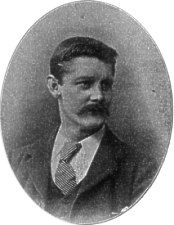
SECRETARY to the Douglas Trades and Labour Council, is the "John Burns" of the Isle of Man. He is a Douglas man by birth and breeding. For several years past he has been in the van of labour movements in the Isle of Man, and many of the improvements-financial and otherwise-that have of late taken place in the Island with regard to the condition of the workers are due to Mr. Quine's initiative. Mr. Quine is by trade a compositor; he served his apprenticeship in the Examiner printing office, and since "coming out of his time" he has continuously been employed in such office Mr. Quine is also Secretary to the Douglas branch of the Typographical Association.
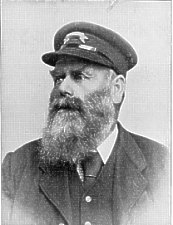
IS the popular Custodian of Peel Castle. Mr Cashen, who was born at Dalby in the year 1858. spent many years of his early life at sea--both in the foreign and home services. He has also had considerable experience as a drift net fisherman. In 1877 he was appointed Assistant Harbour Master at Peel, and in 1896 he was preferred to his current position He is one of the finest living exponents of the Manx language, which he speaks and reads fluently. Mr Cashen is the original of Pete in Hall Caine's novel "The Manxman." The leading of the fishermen by Pete to Tynwald, with the object of confronting the governor, described in "The Manxman." is founded upon a similar incident which actually occurred in 1874.
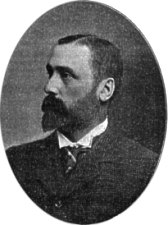
IS President of the Liverpool Manx Society. Mr. Curphey was born in Douglas about half a century ago; his father, Mr. Alderman Curphey-a worthy and respected citizen-being still living. In early youth Mr. Curphey went to Liverpool, and like many another Manx lad he has by industry and business ability secured for himself a foremost position in the City on the Mersey. Mr. Curphey is in the corn trade, and does a very large business, and there is no man more respected and esteemed on the Liverpool Corn Exchange.
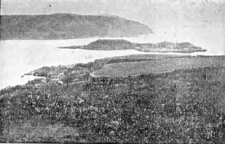
THIS is a view of a portion of the Calf of Man as seen from the mainland. The islet, which is the property of Mr. William Leece Drinkwater Cary, has of late been brought into considerable prominence by reference to it in the English Press. The area of the Calf is just under 1,000 acres, 130 of which are arable land. The remainder is moorland and rock. Rabbits in thousands make the Calf their home, and the islet is also a famous breeding place for seabirds of many varieties. In the seventeenth century an Englishman named Bushell lived a Hermit's life on the Calf, and the remains of his hermitage can yet be seen. The Sound, which divides the Calf from the moorland, is about half-a mile wide, and teems with fish. The view is published by kind permission of the proprietors of the Illustrated Mail (London).

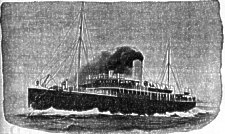
THIS is a picture of the popular twin screw steamer "Duchess of Devonshire," the latest addition to the fleet of steamers owned by the Barrow Steam Navigation Company, and plies between Douglas and Barrow during the season. She was built in 1897 by the Naval Construction and Armament Company, Barrow (now Messrs. Vicker, Sons, & Maxim), and her dimensions are-length, 300 feet; beam, 35 feet; depth, 15 feet. She is built entirely of steel, and has triple expansion engines of 5,200 indicated horse-power; steams 21½ knots, and frequently accomplishes the passage between Douglas and Barrow in 2½ hours The Barrow Steam Navigation Company was formed 32 years ago with the object of developing Steam communication with the port of Barrow. Messrs. James Little and Company undertook the management, and their first efforts were directed to the Isle of Man passenger trade. The steamer "Herald" commenced running between Barrow and Douglas daily during the season of 1867, and by means of well-directed enterprise, and the excellent facilities afforded by the port of Barrow, this route has been a favourite one to tourists, and during the season, June to September, steamers run daily from Barrow and from Douglas In 1867 the Morecambe and Belfast steamers were transferred to Barrow, and a good trade has since been developed between Barrow and the North of Ireland The Furness Railway Company have provided a large and commodious station at Ramsden Dock, alongside a new and substantial pier, at which all the sea passenger traffic is conducted.
...
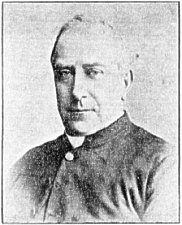
FOR nearly forty years faithfully ministered to the Roman Catholic community in Ramsey, worshipping in St. Maughold's Church. Dean Gillow, who was loved by his own people and esteemed by all classes of the community, was a man of liberal views and of unbounded charity in word, thought, and deed. He died at the age of seventy on the 18th November, 1900, and was buried in Kirk Maughold burial ground on the 21st November.
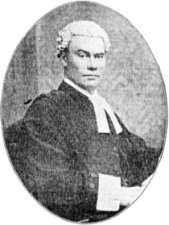
MR. Henry Gordon Shee, Q.C., Recorder of Burnley, was in November, 1900, sworn to act temporarily as a Deemster in the Isle of Man for the purpose of conducting the trial of certain officials of Dumbell's Bank. His Honour's age is 52. His conduct in the Deemstership was popularly admired, and the singing by a Douglas crowd outside the Court House, on November 17th, of a parody, "For Shee's a jolly good fellow," may be regarded as the expression of the Manx people generally.
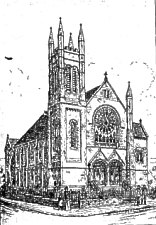
The foundation stones of this, the latest addition to the public buildings of Douglas, were laid April 13th, 1899, and the Church was opened July 19th, 1900. It will seat 800 persons. The building was erected by the late Mr. W. Kelly from designs by Mr. J. Wills, F.S.Sc., of Derby.
|
|
||
|
Any comments, errors or omissions
gratefully received The
Editor |
||